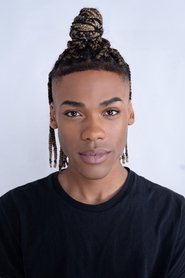
Ask Your Own Question
What is the plot?
Byron, a 15-year-old from the small ex-mining town of Hucknall, is bullied at school for being effeminate and faces daily scorn, abuse, and violence from classmates and townspeople. At home, Byron's father, Steve, a local security guard and self-styled "tough guy," expresses bewildered contempt and further emotional abuse, leaving Byron isolated and desperate for acceptance. The only unconditional love and support comes from Byron's grandmother, Joe, whom Byron calls "Mommar." Joe provides a safe haven, offering comfort and understanding without judgment. Byron's main escape is music, and the Madonna song "What It Feels Like for a Girl" becomes a personal anthem.
Desperate to escape the suffocating environment, Byron begins seeking excitement, glamour, and money outside the confines of Hucknall. This leads Byron into dangerous situations, including casual sex with older men for money. Byron's journey into Nottingham's queer nightlife begins when they sneak into clubs, seeking belonging and freedom. There, Byron is introduced to the "Fallen Divas," a chaotic, hedonistic group of gay men and trans women, many of whom are sex workers. The Divas, led by the charismatic Lady Die, adopt Byron into their makeshift family, offering support, affirmation, and some protection, but also exposing Byron to a world of drugs, hedonism, and moral ambiguity.
Within the Divas, Byron forms a close but complicated friendship with Sasha, a sharp-tongued young woman who grew up in care and is fighting to survive through sex work and petty crime. Sasha's only male connection is Liam, a figure of toxic masculinity who becomes an object of desire for both Byron and Sasha, leading to tension and rivalry. Byron also meets Max, another rent boy, and the two quickly become romantically involved after Byron confesses love the morning after their first encounter. However, Byron's mother discovers the relationship and threatens Max with police action, forcing them apart.
As Byron's self-discovery deepens, they begin to explore their gender identity more openly, eventually deciding to live as a woman. This decision is met with resistance from Byron's family, particularly Lisa (Byron's mother), who scolds and rejects Byron's transition. Despite this, Byron persists, finding strength in the support of the Divas and the memory of Joe's unconditional love. Byron applies to the University of Birmingham, hoping for a fresh start, but is rejected by the admissions board, which Byron perceives as transphobic.
Devastated by the rejection, Byron seeks out Die, who has since become a professional dancer, but finds her emotionally distant. Meanwhile, Sasha has disappeared, and no one knows her whereabouts. Byron's search leads to a chance encounter with Max at a bingo hall; Max offers to reconnect, but Byron, still hurt by their past, refuses to unblock his number. Byron's determination to find Sasha intensifies, and after discovering a cryptic ad from Sasha in a newspaper, Byron and Die call the number together, leading to a tense but ultimately joyful reunion with Sasha.
Amidst these personal struggles, Alison, a supportive figure, informs Byron that the University of Brighton has invited them for an interview and removes a derogatory tag, offering a glimmer of hope. Byron celebrates this small victory by clubbing with the Divas, embracing the freedom and acceptance found in their company. However, upon returning home, Byron discovers Joe coughing up blood and rushes her to the hospital, where doctors deliver the devastating news that Joe is dying from lung cancer.
In a moment of vulnerability and need for connection, Byron unblocks Max's number and spends the night with him, only to find Max still engaged in sex work and living in a dilapidated apartment, highlighting the harsh realities of their lives. Torn between personal ambition and family duty, Byron chooses to stay by Joe's bedside instead of attending the Brighton interview, sharing final moments and conversations with Lisa as Joe passes away.
After Joe's death, Byron returns to Max's apartment, but Alison leaves a voicemail informing Byron that the Brighton interview has been postponed due to the death of Byron's grandmother. Seizing this second chance, Byron attends the rescheduled interview and makes a strong impression, ultimately being accepted to the university. Hopeful for a new chapter, Byron invites Sasha and Die to join her in Brighton, but both refuse, each grappling with their own struggles and unable to leave their current lives behind.
In the final sequence, Lisa drives Byron to the bus station, revealing that she told Alison about Joe's death, which led to the second interview opportunity. Lisa expresses a tentative willingness to try to understand Byron, marking a fragile but significant step toward reconciliation. As Byron boards the bus to Brighton, she begins using the name Paris, symbolizing her full embrace of her identity and the start of a new life away from the pain and constraints of her past.
What is the ending?
At the end of What It Feels Like for a Girl (2025), Byron, having fully embraced her identity as Paris, secures a place at the University of Brighton. After the death of her grandmother Joe, Byron says goodbye to her friends Sasha and Die, who choose not to move with her. Lisa, her mother, begins to show signs of understanding. Paris starts her new life at university, symbolizing a hopeful new chapter.
The ending unfolds scene by scene as follows:
Byron, now living as a woman, faces rejection from the University of Birmingham due to transphobia during her interview. Lisa, her mother, continues to scold Byron for transitioning, showing ongoing familial tension. Byron visits Die, who has become a professional dancer but remains emotionally distant. The whereabouts of Sasha, Byron's friend, are unknown at this point.
Byron unexpectedly meets Max at a bingo hall. Max offers to reconnect, but Byron hesitates and does not unblock his number immediately. Later, Byron and Die discover an advertisement placed by Sasha in a newspaper. They call the number together and reunite with Sasha, restoring a key friendship.
Alison, a supportive figure, informs Byron that the University of Brighton has invited her for an interview and removes a negative tag from her application. To celebrate, Byron goes clubbing with the Divas, a group of friends. Upon returning home, Byron finds her grandmother Joe coughing up blood. She takes Joe to the hospital, where doctors inform Byron and Lisa that Joe is terminally ill with lung cancer.
Byron unblocks Max's number and spends the night with him. However, Max is still involved in sex work and lives in poor conditions, highlighting ongoing struggles. When the day of the University of Brighton interview arrives, Byron chooses to stay by Joe's bedside instead of attending. Joe passes away, and Byron talks with Lisa during this difficult moment.
Shortly after, Alison leaves a voicemail for Byron explaining that the university has postponed the interview due to Joe's death. Byron rushes to attend the rescheduled interview and makes a strong impression, ultimately being accepted.
Byron offers Sasha and Die the chance to move to Brighton with her, but both decline, choosing to stay behind. Lisa drives Byron to the bus station and tells her she will try to understand her transition better. Byron realizes Lisa informed Alison about Joe's condition, which helped arrange the second interview.
The final scene shows Byron starting university under her chosen name, Paris, marking the beginning of her new life and identity.
In terms of character fates:
- Byron/Paris moves forward with her life as a woman, accepted into university, symbolizing progress and hope.
- Lisa, Byron's mother, begins a tentative journey toward acceptance.
- Joe, Byron's grandmother, dies from lung cancer, a pivotal emotional moment.
- Sasha and Die remain in their current lives, choosing not to relocate with Paris.
- Max remains in a difficult situation, still involved in sex work and living in poor conditions.
This ending highlights themes of loss, resilience, and the complex dynamics of family and friendship during a transgender coming-of-age journey.
Is there a post-credit scene?
The TV show What It Feels Like for a Girl (2025) does not have a post-credit scene. The available detailed ending explanation describes the final moments where the protagonist Byron says goodbye to her friends after inviting them to follow her to Brighton, but there is no mention or indication of any scene after the credits. None of the other search results provide information about a post-credit scene for this show, and the focus on post-credit scenes in other franchises like the MCU does not apply here.
What motivates Byron to leave their small town and how do they initially experience life in Nottingham?
Byron is motivated to leave their small town due to the scorn, abuse, and violence they face for being perceived as 'girlie.' They find solace in the queer nightlife of Nottingham, where they are taken under the wing of the 'Fallen Divas,' a group of supportive individuals who offer them a sense of belonging and protection. Initially, Byron experiences a world of hedonism and danger, but also finds acceptance and support among this new family.
How does Byron's relationship with their family, particularly their father and grandmother, influence their journey?
Byron's relationship with their family is marked by conflict and rejection, especially from their father, who is a local security guard and embodies traditional masculine norms. In contrast, Byron's grandmother provides unconditional love and acceptance, serving as a source of comfort and support. This dichotomy plays a significant role in Byron's decision to leave their hometown and explore their identity in Nottingham.
What role does Liam play in the story, and how does his character impact Byron and Sasha?
Liam is portrayed as a symbol of toxic masculinity and is involved in a disturbing encounter with Byron. This encounter has a profound impact on Byron's life. Liam also has a significant influence on Sasha, who is drawn to him despite his negative influence. Both Byron and Sasha experience intense emotions and conflicts due to their interactions with Liam, which shape their personal journeys and relationships.
How does Byron's transition and identity exploration unfold throughout the series?
Byron's transition and identity exploration are central to the series. Initially, Byron faces challenges and rejection, including a failed university interview due to transphobia. However, as they become more confident in their identity, they begin living openly as a woman. The series subtly weaves questions about Byron's gender identity throughout, culminating in their decision to use the name Paris at university, marking a significant step in their self-acceptance and transition.
What is the dynamic between Byron and Sasha, and how do their characters influence each other?
Byron and Sasha have a complex and often tumultuous relationship. Sasha, who has grown up in care and lacks stable support, finds a sense of belonging among the Fallen Divas. Through their interactions, Sasha discovers aspects of herself, partly due to her feelings towards Byron. Meanwhile, Byron's journey is also influenced by Sasha, as they navigate their own identities and experiences within the group. Their dynamic is marked by both rivalry and mutual support, reflecting the challenges and bonds formed within their community.
Is this family friendly?
The TV show What It Feels Like for a Girl (2025) is not family friendly and contains several potentially objectionable or upsetting elements for children or sensitive viewers. It deals with mature and intense themes including:
- Severe sexual content and nudity, including scenes involving sex work and intimate relationships.
- Moderate violence and intense scenes, including references to abuse and family conflict.
- Severe profanity throughout the series.
- Severe depiction of alcohol, drug use, and smoking, reflecting the chaotic and underground club scene.
- Themes of self-discovery, gender identity, and queerness are central but portrayed with raw honesty and sometimes harsh realities.
- Some scenes may be emotionally distressing due to family problems, abandonment, and grooming implications.
Overall, the show is a gritty, raw coming-of-age drama aimed at mature audiences and is not suitable for children or those sensitive to explicit content or difficult emotional themes.































